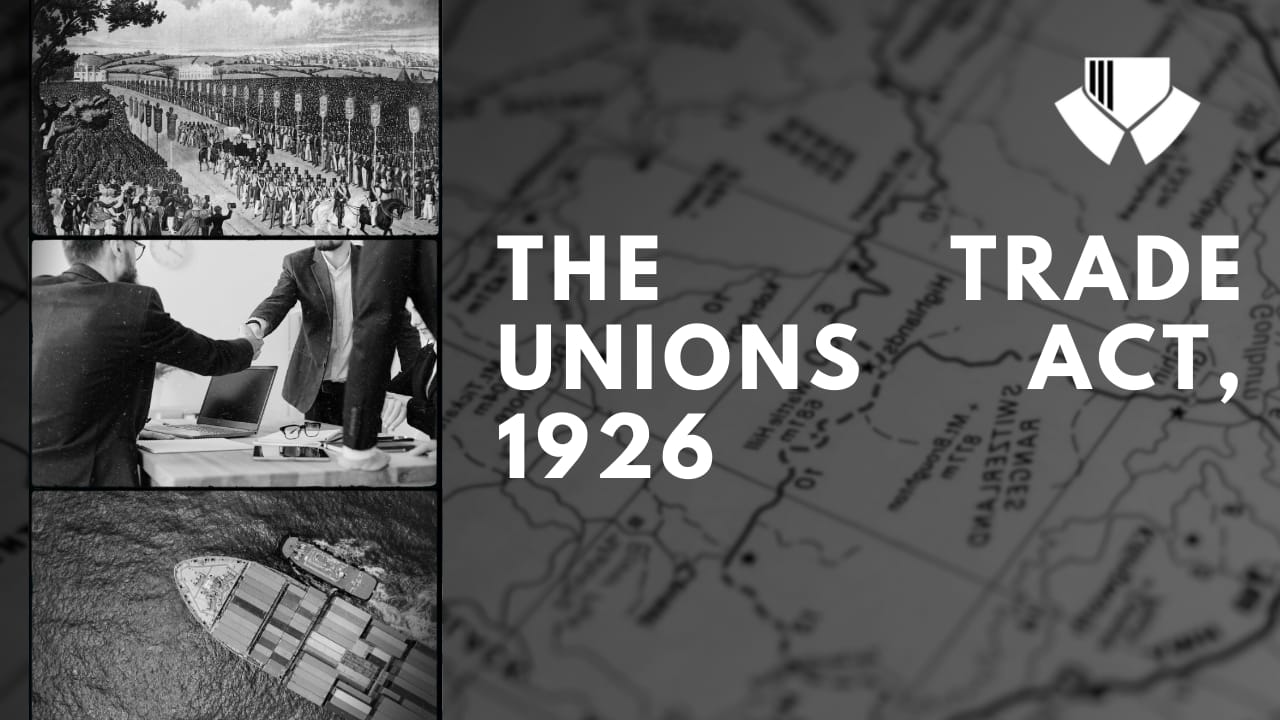This Blog is written by Sumita Patra, a 3rd year law student of Amity University, Mumbai.
INTRODUCTION:
Trade union and labour union plays an important role in today’s organization where a person gets relief from unwanted disturbance in the workplace. In simple words, a trade union means an organization of workers that have banded together to achieve common goals such as better work conditions The international labour organization (ILO) recognized that, trade unions are an essential part of a country’s modernization system.
HISTORY:
The trade union in India has a long history. Workers were brutally exploited and forced to do work without any recourse. They did not find any way to get rid of this. They used to have a lot of objection so; they came together and formed a union to defend themselves from the harsh treatment in the workplace. They created labour unions and protested on a large scale against the employer. This is how trade union have started. The first trade union came up in Bombay in 1850. Trade union came up in Calcutta in 1854 with establishment of jute mill. Sohrabji Shapuri Bengali and C.P Majumdar became the first leader and early pioneers in trade unions. The second factory commission got a memorandum which mainly focused on the bad working conditions, but no action was taken by them. the outcome of this was that on 21st April 1890, around 10000 workers gathered in Bombay for a mass gathering, strikes occurred between 1882 and 1890 in Bombay and madras. The international labour organization recognized the decision that workers should organize unions for their rights. So, the labour union movement started in 1920s and regulation of trade union began in 1926 with trade union act, 1926. This act proved to be beneficial to the workers whose rights are infringed.
OBJECT OF THE ACT:
Trade union act, 1926 connected with registration and protection of trade unions. The objects of this act are;
- To give the protection against exploitation of workers..
- To represent the grievance of employees .
- To protect and safeguards rights of workers, which is provided under labour laws and In Indian constitution.
- To protect rights of employees by taking active participation in the management.
- To enlarge opportunity for promotion and training.
- To secure power to influence government in the interest of workers.
- To provide better economic returns. For example, compensation, gratuity, pension etc.
IMPORTANT PROVISION:
| Sr. No. | SECTION | PROVISION |
| 1. | Section 3 | Defines ‘trade union’ as an association of workers with the principal object of regulating relations between workers and employers. |
| 2. | Section 4 | Requires trade unions to apply for registration with the Registrar with prescribed information and procedures. |
| 3. | Section 5 | Allows for cancellation or withdrawal of registration in certain cases like contravention of provisions. |
| 4. | Section8 | Mandates recognition of trade unions by employers for collective bargaining purposes. |
| 5. | Section 13 | Mandates recognition of trade unions by employers for collective bargaining purposes. |
| 6. | Section15 | Prohibits discrimination against employees for trade union membership or activities. |
| 7. | Section 16 | Covers procedures for change of name, amalgamation, dissolution of registered trade unions. |
| 8. | Section 17 | Requires registered trade unions to maintain accounts and file annual returns with the Registrar. |
| 9. | Section 18 | Empowers government to make regulations for the Act’s administration and conduct of trade unions. |
| 10. | Section 22 | Prescribes penalties like fines for various offenses like failure to submit returns, furnish information. |
PENAL PROVISIONS
| Sr. No. | SECTION | PROVISIONS |
| 1. | Section 22 | Offenses like failure to submit returns can be punished with fines up to Rs.500, defiance up to Rs.200. |
| 2. | Section 24 | Misuse of trade union funds or property can invite fines up to Rs.1000, jail up to 1 year or both. |
| 3. | Section 25 | Breach of agreement can result in fines up to Rs.200 and/or suspension/cancellation of registration. |
| 4. | Section 26 | Embezzlement or misappropriation of funds can lead to fines up to Rs.1000, jail up to 2 years or both. |
| 5. | Section 27 | Unlawful strikes/picketing can invite fines up to Rs.50, jail up to 1 month or both. |
NEED AND SIGNIFICANCE:
Many of the workers are member of any one of the trade unions. There are many reasons to join trade union as its beneficial for the workmen in the workplace. Some of the reasons are mentioned below;
•Security of employment and protection against accident, death, and secure social security cover after retirement.
•Fulfill affiliation needs of the workmen and improve productivity with management.
•To get a platform – sometimes, workers feel very low grade because of their overall performance , they feel scared of loosing job but, here they get a platform where they start the new beginning with their views, aims, ideas and feelings .
•Make use of the ‘principle of unity’ for the purpose of securing good working conditions, high economic compensation, better career prospects.
•Trade union also help workers from unnecessary actions taken by management. They can restrict management action if they feel its against the interest of workers.
CRITICISM AND LIMITATION:
Although joining a trade union is the beneficial for the workers in all sense but, it also has some limitation.
Some critics argued that labor un ions can make a company less competitive , they sometime face losses because of giving wages to the workers.
Trade union is not for every employees. In the case of Tamilnadu N.G.O unionj v. the registrar of trade unions(AIR 1962) it was held that a Civil Servants Union cannot be registered under the trade Unions act, 1926.
Trade union not only have limited membership and small size but also there is multiplicity of unions.
The financial position of the trade union is very weak, their average income is very low because of that they cannot fulfill all the requirements.
CONCLUSION:
In conclusion, trade union still play an important role in protecting the workers and help them to enforce their rights in the workplace. Trade unions are also essential for collective bargaining. The main objective of collective bargaining is to improve employees working conditions, negotiate better pay and benefits, and settle conflicts between the employee and the company.trade unions form a crucial component of modern industrial system in india. Trade union is also consider as ‘state’ which is mentioned under article 12 of the Indian Constitution.
In case of violation of legal right, the parties can file writ petition in the supreme court under article 32 and under article 226 in high court.


